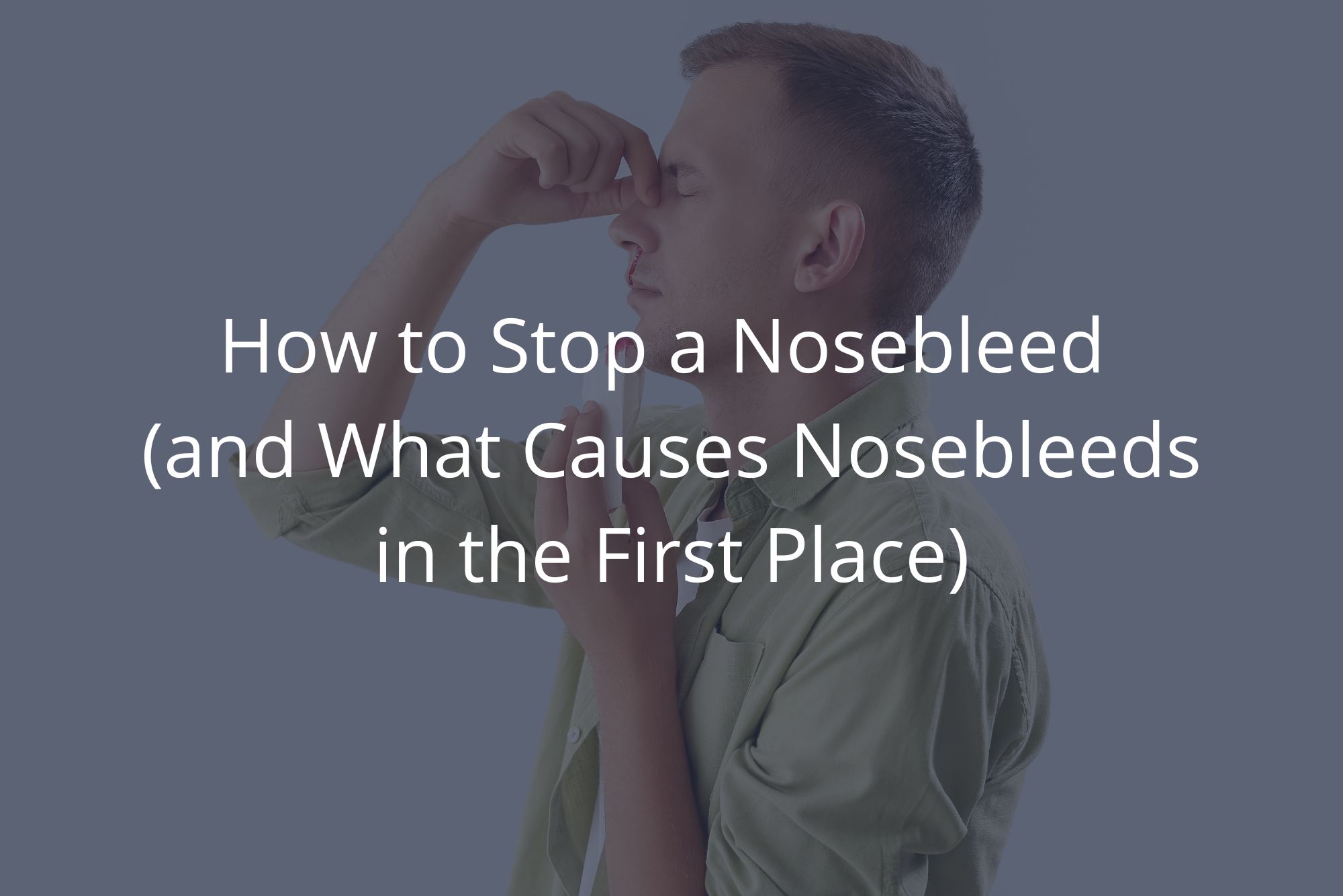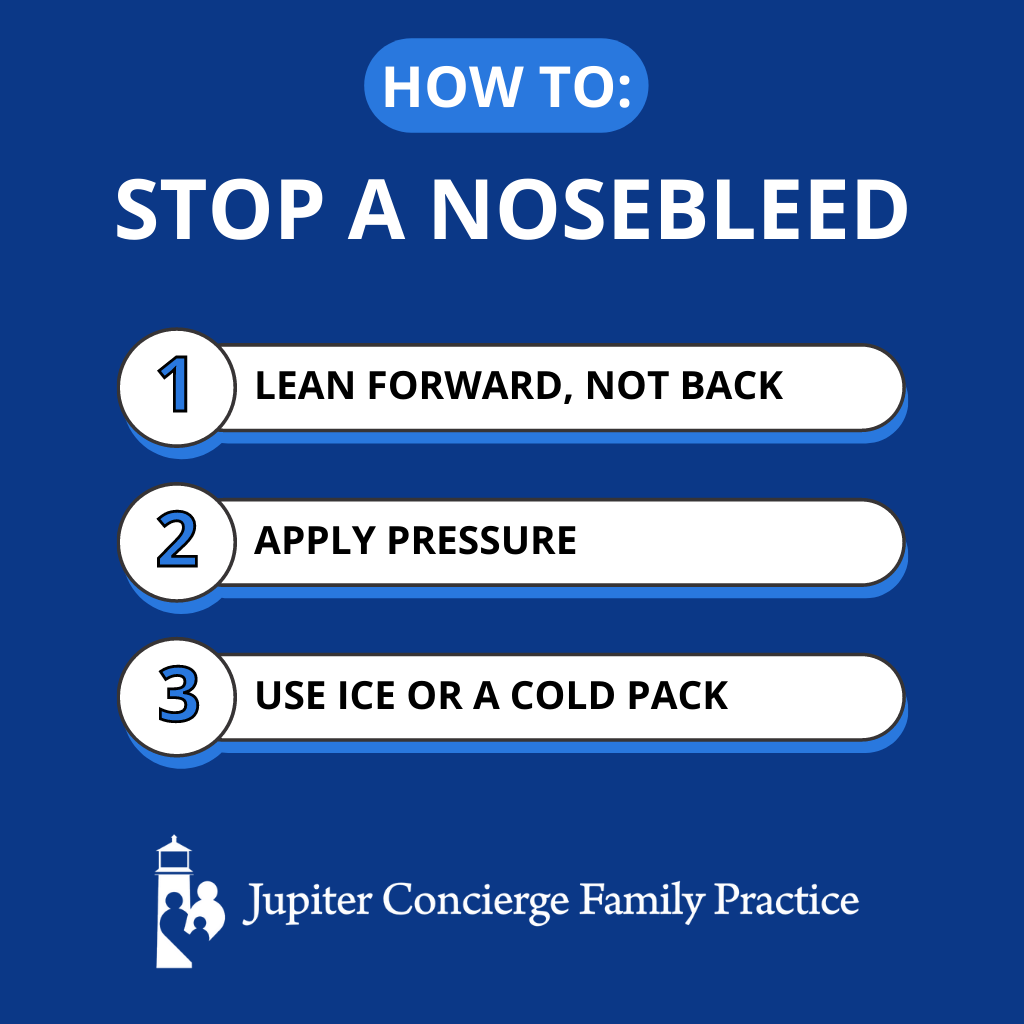
These days, it can feel difficult to find common ground, but I bet most humans can agree that nosebleeds are the absolute pits.
Epistaxis is the official medical name, but call them what you will — blood pouring from the nose is a guaranteed way to bring a good time to a screeching halt. Utterly undesirable, often frightening, and capable of both literally and figuratively turning the stomach, nosebleeds affect about 60 million people in the United States each year.
In this post, we’ll explore this very common (and mostly benign) condition. Perhaps most urgently, we’ll talk about how to stop a nosebleed and how to tell if it’s an emergency. Then we’ll discuss what causes nosebleeds in the first place.
How to Stop a Nosebleed at Home
The first thing to remember about how to stop a nosebleed is not to believe everything you see on TV — most television programs depict an incorrect method for responding to a nosebleed (see step 1 below). Instead, follow these steps.
- Lean forward (not backward) and spit out the blood. This will keep you from becoming nauseated, which most people will if they swallow all that blood.
- Apply pressure to the soft part of your nose for 15 minutes. Applying pressure is the most important step, as it encourages blood clotting.
- Use ice or a cold pack, also on the soft part of your nose. Again apply for 15 minutes. If you have access to a flexible cold pack, you can combine this with step 2 and use the pack to squeeze your nose — that way you’re accomplishing pressure and ice simultaneously.
If your nose continues bleeding after 15 minutes of ice and pressure, try applying Afrin nasal spray to gauze, put it up your nose, and continue to apply pressure. However, there are a couple of crucial points for this to work:
- Keep the gauze wet. If you don’t keep the gauze wet, it will dry out and stick to the inside of your nostrils. When it’s time to remove the gauze, it’ll be painful AND could start the bleeding all over again. Keeping the material damp will ensure easy removal.
- Only use Afrin twice in a 24-hour period for only 48 hours. Overuse of Afrin causes irritation and drug tolerance, meaning it stops working as well and can cause side effects.
- Wait 10 minutes, then reassess. After 10 minutes, check to see if the bleeding has completely stopped — meaning it’s not even dripping down the back of your throat.
If the bleeding hasn’t stopped after a maximum of 30 minutes, seek medical attention.
If the bleeding has stopped, here’s what to do next:
- Keep the moist gauze in your nostril(s) for a little time and notify your doctor of the nosebleed.
- Check your blood pressure. If it’s higher than 180/100, call your physician. High blood pressure is a more serious cause of nosebleeds for which you should seek medical advice.
- Don’t blow your nose, which could reinjure it and restart the bleeding. Use common sense here and allow your nose to heal without doing things that could cause it to bleed again.
How to Tell When a Nosebleed Is an Emergency
While most nosebleeds are benign, they can sometimes indicate a serious underlying condition. When a nosebleed doesn’t stop after 30 minutes or when it’s associated with elevated blood pressure (higher than 180/100), it’s time to seek medical attention.
What Causes Nosebleeds?
In most cases, the causes of nosebleeds are pretty non-threatening or low level. Here are the top five benign causes:
- Dry nose: When mucous membranes dry out, it can cause the blood vessels to burst. Medicines such as decongestants and anti-histamines can dry out the mucous membranes of the nose, as can a dry climate where the humidity is low.
- Trauma: This can range from an impact injury — getting hit in the face with something — to self-inflicted injury from nose picking.
- Sinus infections: The infection itself, along with the associated irritation and medication, can all lead to a bloody nose.
- Irritation: Overuse of nasal sprays can irritate the nasal passages, as can chemical agents like the ammonia in certain cleaning products, which travels through the air and into your nasal passages. In addition, anything snorted into the nose — “snuff” (snorted tobacco), misused prescription medications, illicit drugs — can cause the kind of irritation and damage that leads to nosebleeds.
- Pharmaceuticals: Medical interventions like blood thinners — either in the correct dose or an overdose — can lead to nosebleeds.
That said, more serious underlying causes of nosebleeds do exist. They typically include:
- Abnormal blood vessels. The septum (the divider between the nostrils) is full of blood vessels. For unknown reasons, these blood vessels can sometimes come to the surface and bleed. In such cases, the blood vessel often needs to be cauterized.
- Nasal polyps or other growths. Abnormal growths in the nose or sinuses can sometimes cause nosebleeds. In such cases, an ear, nose, and throat specialist needs to examine the growths to determine their nature and the best course of treatment.
- Underlying bleeding disorders. Rarely, recurrent and recalcitrant nosebleeds can indicate that the body is having difficulty with proper blood clotting. This could stem from conditions such as an underlying genetic clotting disorder or specific types of cancer, such as leukemia.
Conclusion
Nosebleeds are usually harmless — albeit highly unpleasant. Since they’re relatively common, it’s valuable to know how to stop a nosebleed at home instead of having to run to urgent care with each occurrence.
However, nosebleeds can sometimes signal more serious underlying conditions. Of course, you should certainly seek immediate medical attention if the bleeding doesn’t stop. But even if you get the bleeding under control, always notify your doctor of nosebleeds, especially when recurrent ones.
Your physician can help you figure out what’s causing your nosebleeds so you can get back to business, life, and recreation as usual.

Dr. David Rosenberg
Dr. Rosenberg is a board-certified Family Physician. He received his medical degree from the University of Miami in 1988 and completed his residency in Family Medicine at The Washington Hospital in Washington, Pennsylvania in 1991. After practicing Emergency Medicine at Palm Beach Gardens Medical Center for two years, he started private practice in Jupiter, in 1993. He is an avid baseball fan and Beatles fanatic, since he was 8 years old. He has been married to his wife, Mary, since 1985 and has three grown children.
David completed additional studies at Mercer University, Macon, Georgia and obtained a BS in Chemistry in 1983.
“My interests include tennis, snow skiing, Pilates and self-development.”

